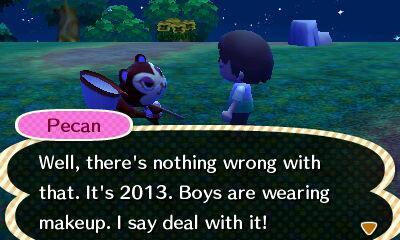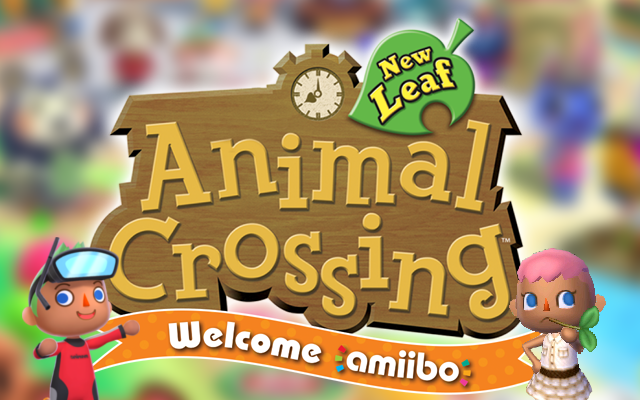On November 2nd, Animal Crossing: New Leaf released a major downloadable update, freshening up the popular slice-of-life sim four years after its initial release. As the subtitle suggests, the Welcome Amiibo update means New Leaf now supports amiibo cards and figures. This brings in a swarm of new features along with it including furniture from previous game Happy Home Designer, 50 previously discontinued villagers, an entirely new RV campsite area, and a whole lot more. One thing it didn’t touch? Racial diversity. Despite darker skin tones already being optional in Happy Home Designer, New Leaf‘s human residents only come in one flavor: creamy, homogeneous vanilla.
You can be anyone (as long as you’re white)
Representation matters. This should not really be up for debate, but if you disagree, I’ll give you 30 seconds to google how the dearth of diversity in entertainment reflects back onto society. From First Lady Michelle Obama to academic journals like Communication Research, more and more sources are coming to the same conclusion; the way racial and gender groups are portrayed in media affects the consumer’s real-world perception of those same groups. This is especially critical with video games, in which we take control of an avatar, in a sense, literally becoming that character. What kind of message does it send that the heroes we’re meant to embody are all white men?
It’s easy to say, “I don’t care if my identities are represented in video games,” when you’re already being represented in video games. Kudos, I guess, to the cis, straight, white men who have no problem with playing as Faith in Mirror’s Edge. Don’t worry. You can always get back to being Gordon Freeman, or Nathan Drake, or Mario, or any of the countless brown-haired, scruffy white guys completely saturating the mainstream video game industry.
Games like Mirror’s Edge, while indicative of progress, are not the norm and should not be treated like the blanket solution for sexism and racism. When marginalized identities do make an appearance on-screen, they’re almost never the main protagonist and usually play out one or more stereotypes in the periphery. Looking at you, inFAMOUS. And the token minority side characters of [PROTOTYPE] and Final Fantasy. And the small army of damsels in distress at the end of most RPG dungeons. And the “muscular, Black man party member” stereotype. And like every 20 seconds of Grand Theft Auto.
Games like Animal Crossing — in which you can customize your player character — should be a reprieve from the onslaught of protagonist hegemony, finally letting players see themselves in the starring role. In terms of gender, while far from perfect, the series has taken great strides in the right direction. Whether you choose to represent your Mayor as “male” or “female,” you can dress them however you want to. The freedom to choose from a variety of wardrobe and hairstyle options helps players immerse themselves more comfortably in a gaming experience that, for many, can be a coping strategy for daily stress and also provides a virtual space for transgender players to temporarily escape gender dysphoria.

I feel that I am well-represented by my Mayor. Like me, they wear a lot of flannel. Unlike me, their hair is blue, but that’s just one of many cool ways for me to explore self-expression through them as proxy. But I’m also white. I have never felt alienated by my Mayor’s light skin, but I know many players who have. It is a privilege for me not to be confronted with racial exclusion every time I boot up my town.
Literally why hasn’t this been fixed yet?
The most frustrating part of this issue is that the mechanics for darker skin tones are already built in, but still have not been made a freely customizable feature. Tanning, which was first introduced in City Folk, darkens players’ skin naturally if they spend enough time in the sunlight. Unfortunately, this only works in the summer months and can take up to five hours of continuous sunlight. And you can’t be wearing a hat. And it wears off.

To give Welcome Amiibo a sliver of credit, it does change the skin tone of players’ arms and legs to match the Mii mask, if you choose to wear it. Previously, if you had a dark-skinned Mii mask, your arms and legs would still stay pasty pale, making it seem like you’re wearing an all-white bodysuit. So that’s a start, but let’s be real, Mii masks are hideous. They look completely out of place among Animal Crossing‘s art style and by existing as the “solution” to choosing skin tone, they further exclude players of color.
These “loopholes” are unrealistic and unfair for players who want to see themselves represented in the game. The fact that Nintendo would invest so much time and money into an entirely new RV aspect of gameplay, but neglect to patch their own racism is ridiculous and insulting, especially since the possibility for a greater variety of skin tones is clearly already present in the code.
Many have argued that Nintendo shouldn’t be “catering” to an audience outside of their ethnically homogeneous home country of Japan, whose customer base, while certainly not white, can identify with the lighter skin available in the games. I bring this up not to undermine the rampant whitewashing inflicted upon Japanese media products by American adaptations — which has too-often been justified by erroneously interpreting Japanese characters as white — but instead to point out that Animal Crossing being inclusive towards Japanese and white gamers does nothing to combat the exclusion of dark-skinned players.
I’d also point out that New Leaf is a global product. In the United States alone, it sold 1.36 million copies. People of all racial identities are playing this game that focuses so heavily on customization and expression. So why hasn’t this been fixed yet?
My argument is not a new one. Since New Leaf‘s release, many writers of color (Kotaku, ClockworkWorlds, and Polygon) have addressed the issue of exclusively light-skinned player characters. But with the new update doing almost nothing for racial diversity when it had every opportunity to do so, it is more important than ever for white gamers to support the voices of people from all racial backgrounds in the gaming industry, and pressure Nintendo to do better. Animal Crossing is supposed to let you create, as their website advertises, “the perfect place to live,” but a white-only town simply isn’t that place. It’s about time the developers extend this opportunity to everyone, without forcing them to compromise on racial representation. But, thanks for letting us sit on rocks now I guess.







Published: Nov 5, 2016 09:38 am